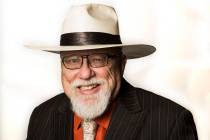Old age, illness not pretty picture
I sailed on teardrops to memories I’d rather not have.
Memories from 10 years ago that I suspect could one day be very much what my reality will be like.
So it goes when you see “Amour,” a French-language film now playing in Las Vegas — it’s nominated for five Academy Awards — that focuses on an elderly couple, Anne and Georges, who are retired music teachers with a daughter who lives abroad.
Surgery on a blocked carotid artery goes wrong, leaving Anne partially paralyzed on one side of her body and confined to a wheelchair. Later, her condition worsens as she suffers another stroke.
How her failing health cripples them — Anne made her caregiver husband promise he won’t send her back to the hospital — is the kind of horrific circumstance so many of us have seen play out in the daily lives of parents and relatives.
As I watched the movie, in which joy’s essentially found only in flashbacks, the actors frequently gave way in my mind’s eye to images of my elderly father and mother trying to cope, largely alone, in their Michigan home after he had a botched surgery.
A heart attack coupled with a stroke partially paralyzed one side of his body, leaving him in great pain and with a pronounced limp that he allowed no one outside the home to see.
A World War II veteran who prided himself on self-reliance — at the age of 12, he became the breadwinner for his mother, brother and sister when his father died — my dad hated that my mother, or a nurse, had to help him dress and bathe or clean him after an “accident.” Though he couldn’t do it himself, he insisted he could and my parents, always in love, argued like never before. Day after day. Mother often cried.
Things worsened when my mother, who’d strain to get Dad out of the tub, needed a pin to hold her hip together.
When I visited, my father didn’t like me seeing the daily struggle. Nor did he appreciate that I wanted to help out. He could handle it, dammit. He wondered aloud if I might want to go home.
The madness often accompanying failing health, well-depicted in the film, would come and go in the Harasim household.
My father knew he didn’t have long. He accepted dying, but he wanted his run-up to death on his terms, free of the fear that ending it early would mean insurance companies could escape paying what he wanted to leave his family. The tongue lashing he frequently gave the world for not letting people control how they went out didn’t prevent him from dying in the hospital.
My mother, spent by months of Dad’s death throes, would end up enfeebled by Alzheimer’s, dying horribly last year.
Unfortunately, I can see myself acting like my father should I end up in a similar situation. I don’t want my wife or children or strangers having to take care of me as I come to the end of my life. It’s my job, my life. If I can’t handle it, it’s time to hang it up.
It is that kind of mindset that has made anti-aging medicine the fastest-growing medical speciality in the world. Baby boomers, realizing they soon may be in the undignified position of needing someone to change their diapers as their organs shut down, are spending billions on everything from customized drug cocktails to human growth hormone to prevent or delay the degenerative diseases usually associated with old age.
Whether it does any good for anything other than doctors’ bank accounts remains to be seen.
If this new medical speciality turns out to be just another dead-end in the search for the fountain of youth, don’t be surprised if many boomers push hard nationwide for the option of legal suicide when illness makes death a certainty –– it’s now available only in Oregon and Washington.
I think the ancient Greeks got it right: God helps those who help themselves.
Paul Harasim is the medical reporter for the Las Vegas Review-Journal. His column appears Mondays. Harasim can be reached at pharasim@reviewjournal.com or 702-387-2908.

















